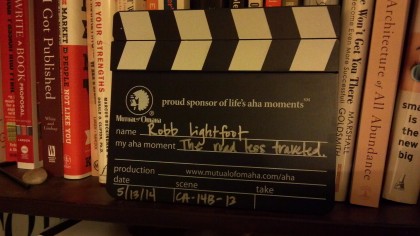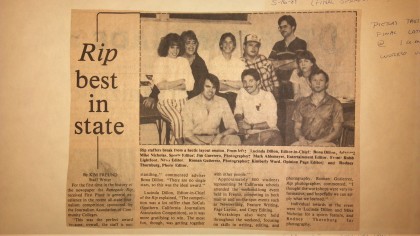After the final no there comes a yes
And on that yes the future world depends.
Wallace Stephens
A Well Dressed Man With A Beard
I faced the camera, and the smiling woman hovering next to it cued me.
“So,” she began, “tell me about your ‘aha’ moment, that instant when everything changed.”
I nodded, and took a deep breath.
“I was a summer intern in a law office,” I said, “I’d just finished my BA, and had a full-ride scholarship to law school.”
“What was that like?”
“At first, it was rush. I’d busted my chops to get in, and all my teachers, friends and family were thrilled. Our university-housing was set. My wife, Karin, was wrapping up her job so we could move.”
“When did you start?”
I shook my head.
“I didn’t. After a a couple of weeks as an intern, I called UC Berkeley, withdrew, and gave them back their scholarship.”
My interviewer blinked. “Really? Why?”
I sighed.
“I spent days watching an unending parade of contentious clients—divorcées, warring business partners, accident victims. And I had an epiphany, my ‘aha moment.’ I realized I was plunging, pell-mell, towards the unhappiest profession on the planet instead of doing my dream job.”
“Which was?”
“Reporting.”
“What then?”
“I went home and told Karin to stop packing.”
The interviewer chuckled. “Now that must have been some conversation.”
“It was a long night,” I agreed, “but in the end she hugged me and told me to get writing.”
**
That’s the story I shared with the Mutual of Omaha film crew, and it’s entirely true. But like the Reader’s Digest Abridged version, it leaves out a lot—such as the heroes who helped me through an awkward transition, escaping drudgery in pursuit of a dream.
To say Karin was supportive is a massive understatement. She’d passed on a great job, and my walking away from law school, my internship and scholarship meant I had no job and no money. Instead of living in the Bay Area—something we both had anticipated–she ended up stuck in Bakersfield, supporting me while I made a sudden career change.
And it wasn’t easy. I’d earned a degree in communication, but I lacked basic news writing classes. I had no clipping file, no portfolio. When I approached the local newspaper, they told me to come back when I had something to shown them.
So after bailing on Berkeley, and being blown off by my hometown broadsheet, I was back in school—at a community college. It was my one and only opportunity, so I dove into journalism with abandon at the Renegade Rip.
It was a humbling turn of events. I’d run into friends, and they assumed I was visiting from Berkeley. They asked me how I liked Cal. I’d grit my teeth, force a smile, and explain. Most greeted this news with puckish expressions and scarcely concealed mirth. They thought I was nuts.
And they were probably right.
But I bore down on the task of amassing a stack of stories. I’d spend long nights at the Rip, sometimes staying until 4 am.
My efforts paid off. I received top-rate instruction in news writing, editing and photojournalism from my teachers: Bona Dillion, Jack Knight and Jonathan Mumm. I rose to the position of news editor at the Rip, and we took first place in general excellence that year at the state JACC competition.
Then in March, I got my first paying job as a writer at the Bakersfield Californian.
The late Bob Bentley, the editor who’d turned me away the year before, finally hired me. He joked that he “had to…” so I didn’t “end up back in high school.”
The Rip gave me my single most valuable college experience. I learned to think and write under pressure and to better understand all manner of people. I met top college administrators, state senators, assemblymen, lobbyists, and even—while working on a piece about adult movies— a porn star. A diverse crowd that shared the common desire to earn an honest living and make the world a better place.
Well, the porn stars do anyway.
And the great thing about being a reporter is that I have all of these moments captured in my clippings file.
Many of these memories were rekindled during a recent visit to Bakersfield College to celebrate the 85th anniversary of the Rip. More than 100 alumni gathered, some who’d been on the paper’s staff as far back as 1951.
We shared our old tall tales, caught up on what had happened in the intervening years, and were reminded—if we ever needed to be– as to what a special role the Rip played in all our lives and in producing generation after generation of journalists.
One story in particular impressed me. Jim Houck, Editor-in-Chief in 1960, described the turbulent time of the early 60’s and how the Rip reported on controversial events of the day, civil rights marches and the antics of anti-communists. He made enemies.
“It was a wonderful paper,” Houck said, “with a staff of great people… My second year was marked by tensions between the paper, the college and surrounding community. It was in part painful, but to a greater extent that journalism is not a popularity contest, and journalists can expect to have few friends.”
Houck described how the college president, John Collins, received a great deal of pressure from his peers in the community to “do something” about the school paper. Collins did have repeated meetings with the Rip’s adviser, but to the credit of both, the Rip staff knew nothing of the agitation to cut their funding and pull the plug.
Houck learned about the threats 40 years later.
During my time at the Rip, from 1983-84, I covered the continuing waves of college cutbacks, tuition increases and threats of program elimination that bedeviled many schools, especially Bakersfield College. I spend many hours in BC administrators’ offices, interviewing them about the school’s budget. When I asked about a tip I’d heard—that the school had extensive real estate holdings—the chancellor said condescendingly: “You don’t need to know that—it doesn’t concern you.”
I was incensed. So I spent several days at the Kern County Hall of Records finding and later reporting on commercial property that belonged to the school.
It was worth a bundle.
I had a blast unearthing suppressed information that went on to be an important part of the budget debate.
The school paper was a great training ground, so it was great fun last week to travel south to Bakersfield College, gather with my old colleagues in the school cafeteria and raise a glass to the Rip.
Afterwards, we toured the newsroom.
Ah, the memories… The old waxing machine that burned my hands more than once is gone, but the newsroom still has that wonderful, dingy, lived-in look. And I think I recognized one of my old pencils sticking from the ceiling.
College newspapers are unique. It’s a shame that many of them have been killed off recently by indifferent or short-sighted administrators. It doesn’t need to be this way. It’s true, many schools have seen enrollment decline in traditional journalism classes. But this is ironic when one considers how blogging is booming, and the need for trained writers is greater than ever. Anyone with a few molecules of imagination could craft a 21st century program that would appeal to the YouTube and Twitter generation.
But, alas, bean counters seem to run the world these days.
So it’s all the more remarkable that the Rip is still going strong as it closes in on 90, and I salute BC for standing solidly behind it’s feisty little rag. But, then, that’s why I am proud to be an alumni not of just the Rip, but of BC.
What makes a community college outstanding? Some point to the football team, and Bakersfield College is a contender there, too. I look at the quality of a school’s debate team and newspaper. BC excels in both. But when it comes to academic achievement, career preparation, or simply training for life, I can offer no better opportunity than that of a well-run paper like the Rip. It’s launched many a career, and even those students who eventually found themselves in some other line of work learned a lot about themselves, writing, and the world they live in by reporting for the Rip.
So I’m forever grateful to BC’s long-ago and current leaders who’ve backed it, even when it was a burr in their butt. I’m also thankful to the dedicated advisers and Rip staffers who were keepers of the flame, and passed the torch to me in my time there. I like to think we left it in pretty good shape when we moved on, too.
But my time at the Rip wouldn’t have been possible without Karin, who stood by me when I reversed course for a year of “postgrad work” at BC. It’s one thing to realize what you want to do with your life, quite another to have the good fortune to have a team of people who rally around you to make it happen. The night Karin that told me to “go for it,” was the moment I began to pursue my dream, and our lives have been forever changed. I am grateful beyond words.
Truth be told, that was my aha moment.
 Robb has enjoyed writing and performing since he was a child, and many of his earliest performances earned him a special recognition-reserved seating in the principal’s office at Highland Elementary. Since then, in addition to his weekly column on A News Cafe – “Or So it Seems™” – Robb has written news and features for The Bakersfield Californian, appeared on stage as an opening stand-up act in Reno, and his writing has been published in the Funny Times. His short stories have won honorable mention national competition. His screenplay, “One Little Indian,” Was a top-ten finalist in the Writer’s Digest competition. Robb presently lives, writes and teaches in Shasta County. He can be reached at robb@robblightfoot.com.
Robb has enjoyed writing and performing since he was a child, and many of his earliest performances earned him a special recognition-reserved seating in the principal’s office at Highland Elementary. Since then, in addition to his weekly column on A News Cafe – “Or So it Seems™” – Robb has written news and features for The Bakersfield Californian, appeared on stage as an opening stand-up act in Reno, and his writing has been published in the Funny Times. His short stories have won honorable mention national competition. His screenplay, “One Little Indian,” Was a top-ten finalist in the Writer’s Digest competition. Robb presently lives, writes and teaches in Shasta County. He can be reached at robb@robblightfoot.com.





